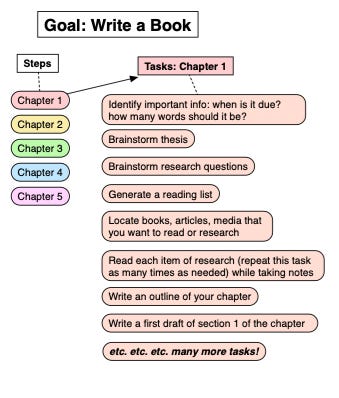Whether your current project is specific—like writing a dissertation or applying to a new job—or you’re working on something general like overhauling your routines or getting your finances in order, every goal is made up of steps and every step is made up of tasks.
Transitioning from a goal to tasks is necessary because we’re unlikely to make meaningful progress if we try to complete a complex, long-term goal like “write a book” or “start a business” in a single productivity session.
Working on a big goal instead of a clear, focused task might result in false starts, surface-level focus, and going down rabbit holes that don’t pan out. After a few hours, you’ll likely just end up feeling disheartened that you don’t have much to show for it.
Quick technical note: sometimes differentiating between steps and tasks can feel tricky, so for today’s newsletter, let’s think about steps as a way of bundling tasks. Here’s a visual I created to show you what I mean. Note that there are many tasks that go into the step Chapter 1:
Image Description: A breakdown of the goal "write a book" into steps and tasks. The purpose of the image is to show that you might need to complete many single tasks in order to feel like you completed one step in the larger process.
If you want to learn more about breaking a goal down into steps and then into tasks, I dedicated a whole chapter of my book Tend to It: A Holistic Guide to Intentional Productivity to it.
Increasing Clarity with Verbs and Tasks
In my experience, we have more effective productivity sessions when we use active, clear verbs and specific tasks on our to-do lists.
Today I want to focus on three types of tasks that land on our to-do lists.
Challenging Tasks: A single activity that might be difficult for us physically, mentally, or emotionally.
Habitual Tasks: A task that involves multiple actions that are habitual, quick, or easy for you to complete.
Complex Tasks: These might seem like a single activity but actually involve multiple component tasks that often take longer than we expected.
Challenging Tasks
Some tasks might seem simple when you jot them down on your to-do list, but ultimately require you to:
Complete them in multiple sessions
Enlist support from others
Utilize a lot of personal resources like time, energy, focus, or spoons to complete them
Here’s an example from my life.
When I was struggling with severe low back pain, it was very difficult for me to change my own bedsheets. Stretching my body across the mattress to tuck the fitted bottom sheet under the corners was excruciating. Because I lived alone, I often needed to ask friends to come over and change my sheets for me. My back pain has improved since then, so changing sheets is doable nowadays, but other tasks still require planning, support, or adjusting my expectation for what “good enough” should look like.
When you make your to-do list, consider which tasks will be most physically, mentally, or emotionally challenging for you. I invite you to be compassionate with yourself as you put these onto your to-do list. You might ask yourself:
Will I need extra time?
Do I need to do these tasks on specific days or times of the day?
Do I need assistance or support?
Habitual Tasks
Some tasks actually require you to complete multiple actions, but those actions have become so habitual that you don’t need to include them on your to-do list.
Let’s use going to therapy as an example. If you do virtual therapy like me, you mail a set of checks to your therapist each month and once a week you make yourself a cup of tea and curl up onto your couch with a cozy blanket, headphones, and your laptop.
Although “going to therapy” technically involves more than one task, the more you practice it the more the process becomes rote. While you likely don’t need to write down all the tasks on your to-do list, you should still pay attention to the total amount of time or energy you need to expend on these tasks so you can plan accordingly.
I welcome you to take a moment and reflect: What tasks do you do on a daily, weekly, or monthly basis that feel easy to complete once you begin?
Complex Tasks
Complex tasks might feel really good to write on our to-do list because completing them will offer us relief or reward. But some complex tasks require a lot of behind-the-scenes labor that will take time, energy, or focus.
I see this a lot with academics. Verbs like edit, revise, read, research, or write serve as milestones to completing our scholarly projects. For example, if your dissertation advisor asks you to do more research before she’ll sign off on your chapter draft, it’s easy to put “research” on your to-do list.
Hooray! You’re so close to being done with this chapter! Just one to-do list box to check off!
But wait, what do you mean by “research”?
Do you need to read articles, books, or could skimming a chapter suffice? Are you searching for definitions, trying to improve your understanding of a theory, or do you need to learn a new topic entirely? Do you need to write a whole section about this research, or would a 1-sentence footnote work?
Depending on your actual purpose for researching, this task could take 30 minutes or it could take 2 months, so it’s important to clarify precisely what you need to do and use appropriate verbs on your to-do list.
Now You Try It!
Like all of my resources, I welcome you to take what works from this exercise and hone an approach that feels accessible and interesting to you.
If you use a to-do list, check your verbs for complex or challenging tasks. If you don’t literally write verbs on your list, I invite you to still pause to reflect on what actions you associate with each task.
Pay specific attention to the following verbs. Unless the task feels habitual, quick, and easy, these verbs might signify a multi-step process and may require more clarity.
GO TO
DO
WORK ON
FINISH
RESEARCH
WRITE
MAKE
I’d love to hear what you think of this exercise! Feel free to respond to this email and tell me which verbs and tasks feel challenging, habitual, or complex.
Small Things that Made Me Big Happy
>> My friend Chris Belcher was interviewed on the Queery Podcast with Cameron Esposito and I just loved listening to her share her wisdom about her memoir, Pretty Baby. I’ve been besties with Chris for almost half my life, and I continue to be amazed by her eloquence, humor, and creativity.
>> My friend Siloh Radovsky released the first episode of her new podcast Experimental Practice. I’m used to hearing Siloh’s voice on our phone chats, so it was really tender to hear her chat with her writing mentor and friend Miranda Mellis about the writing process. I was especially interested in the sections about writing during quarantine.
Updates and Recommendations
>> I love Rachael Stephen’s Constellation System, so I was thrilled to sign up for her Constellation Clarity one-day intensive course on February 11, 2023. She’s offering a discount for anyone who is a member of a union or mutual aid group, so if that’s you be sure to apply for the discount code before you enroll in the course.
>> Kris and I just finished playing the video game Disco Elysium and it was a wild ride! You play as a detective recovering from amnesia, constantly advised by parts of your personality like logic, drama, rhetoric, or electrochemistry. This game was incredibly weird, some of the dialogue was hilarious, and the graphics looked like an oil painting, so I was into it.
If you made it this far in the letter, thank you! Here’s a sweet photo of my brother cats snuggling and resting on my couch in the afternoon sunlight.
Have a wonderful start to your February, tenderhearts! It’s been snowing here in Massachusetts, so I’m sending you all warm, cozy vibes!
Hi, I’m Dr. Kate Henry!
I'm a Productivity Coach and researcher who specializes sustainable and well-being-oriented productivity. If you’re curious about working with me, please book a free 30-minute call via the button bellow to discuss how I can help you to achieve your goals. Want to know more? Check out the links below!
100+ free blog posts at my blog, The Tending Year
My book Tend to It: A Holistic Guide to Intentional Productivity
Customized workshops for organizations and universities
1-on-1 Success & Accountability Coaching (check out some client testimonials)
Intentionally Productive Scholars Program for undergraduates









